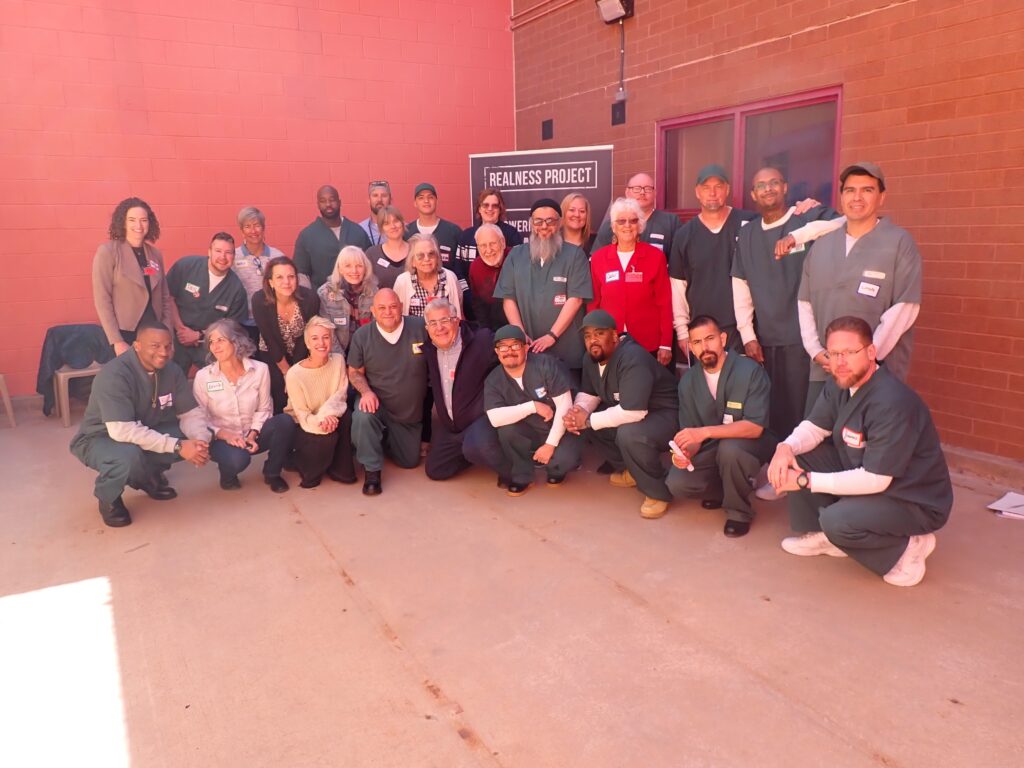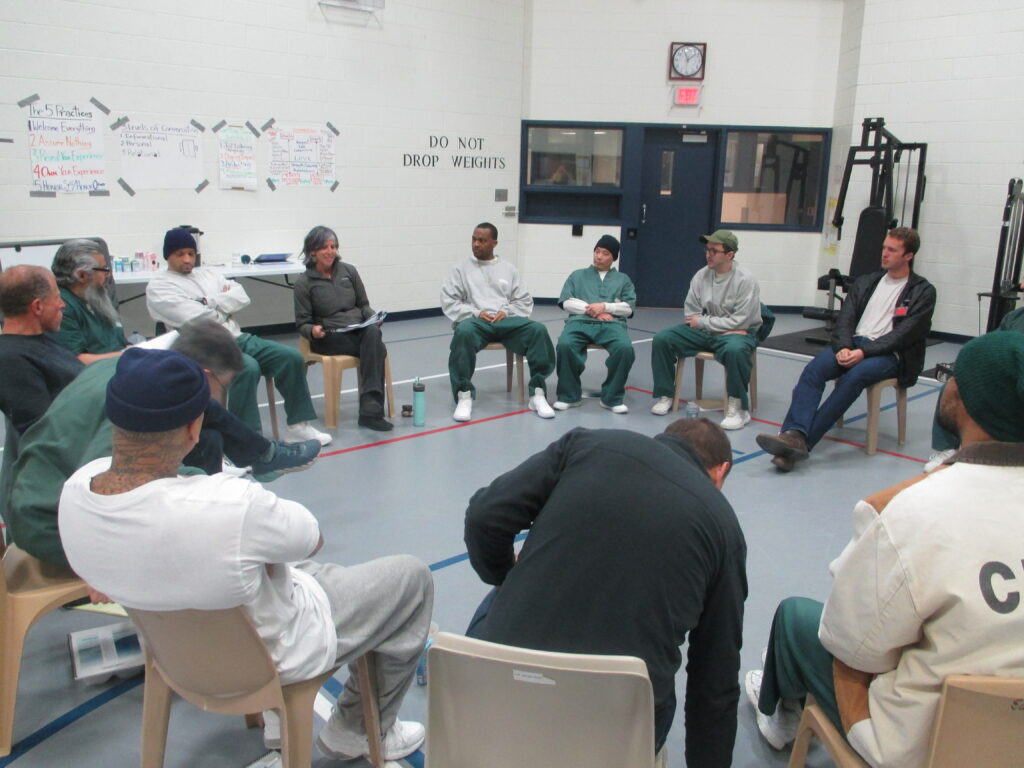
Friday, April 28, 2023
Walking into prison was hard for me.
I am a victim of sexual violence, and like most victims (but not all), my perpetrators were men. A lifetime of being harassed, harangued and stalked in addition to the physical violence has left me more than a little afraid of men.
I don’t enjoy being scared of half the population. I am actively working to overcome my fear. So when Boulder nonprofit Realness Project invited me to attend a graduation ceremony for its most recent cohort in the Colorado State Penitentiary, it seemed like a good, controlled setting for me to get some practice.
Realness Project conducts workshops with incarcerated individuals, helping them learn communication and conflict resolution skills. When I first wrote about Realness Project, I wrote that it was creating safety inside and outside of prison. Now, I have experienced that safety for myself.
I watched grown men cry in front of strangers, in front of their peers. I heard them share stories of their childhood — stories that were not unlike my own upbringing: full of violence and neglect and trauma, although lacking my privilege of (relative) wealth and stability. Even while admitting they were afraid the things they said would be used against them later. They chose to be vulnerable anyway.
When we stood to do some authentic relating exercises, my fear morphed to a worry that I wouldn’t be able to be vulnerable enough. I am too fucked up to be here, I thought to myself. I cannot show up as authentically as these men.
As it turns out, being authentic means showing up exactly as you are in that moment, and expressing it honestly. So I did.
I’m kinda scared of men, I told my first exercise partner. Facing six-foot-tall Steven, I spoke aloud my secret fear, “I’m afraid I’m too fucked up to be here,” and we shared a laugh as well as a lament about having tattoos that are no longer representative of who we are (his, a prominent piece on his chin; mine, a Bible verse on my feet).
In one-on-one conversations, I discussed music, the different ways racism is expressed in the north versus the south, criminal justice reform and the frustrations of programs that exclude violent offenders.
I’m not violent anymore, Jason told me: I’m not offending anymore.
All day long, I watched men beautifully articulate the lessons they learned early on that drove how they viewed the world and interacted with it.
“We were formed with a fist,” said Dan, in a haunting five-part poem that encapsulated a story of trauma and healing I could never match with my own words.
“My first experience of conflict resolution was violence,” said Rob, who at two years old watched his father shoot someone — his earliest memory. His brother was in attendance, dressed in identical dark-green prison scrubs. Their involvement with the criminal justice system began in childhood.
My earliest memory was of wanting something, reaching for it and being pulled away, then scolded for my attempt. My earliest memory is of my needs not being met.
I was met in that prison yard. My deepest need — connection — was met by the very men of whom society is most afraid, of whom they tell me I should be most afraid.
In the real world, when I share that I’m scared of men, the response is often indignation or anger. “Not all men!” they tell me, as if I do not know, as if I am accusing them, as if they can bully and shame me into amending my anxieties.
Not these men. These men, Realness Project graduates and their invited, incarcerated guests, accepted my story without question. Perhaps because they, too, have experienced violence, on both sides. They know of the violence of men.
I am a victim of violent crime (albeit not the type that the criminal justice system has historically been interested in). I do not forget that these men have victims somewhere. Maybe they feel safer with these men behind bars. Maybe you do, too.
And yet, I have never been harmed by a person who was connected with themselves, in touch with their emotions, able to process and communicate them the way the Realness Project taught these men to do. I have looked into the eyes of my abusers, and saw that they were without empathy.
In prison, I had the exact opposite experience.
“Do I deserve to be punished?” asked Shay, a man who had served 23 years of a 48-year sentence. “Yes. Do I deserve to stay in prison for another 25 years? No, I do not believe that I do.”
I do not believe the men I met deserve to remain in prison for decades more. But what can I do? What can I do in a country that incarcerates more people than Russia, than China, than Iran? What can I do when our state lawmakers are still proposing and passing harsher penalties for drug possession and car theft? What can I do when a sizable portion of my community — at least the portion with power and influence — believes that more, more, more of the same will somehow, finally make us safer? How ironic that some of the safest men I’ve ever met are separated from society in the name of public safety.
A note about my experience of safety, including my headline (which, I realize, has huge potential to be misinterpreted): Prisons are fundamentally unsafe places for the people who live and work in them. I do not mean to diminish the very real threats incarcerated people and prison workers face.
That prisons are so unsafe makes it all the more impressive that these men were able to create safety for themselves and others. Why shouldn’t they be part of the solution of increasing safety for the world outside of prison, too?
— Shay Castle, @shayshinecastle or on Mastodon at toot.bldrweb.org/@shayshinecastle
“I love the fact this class is bringing a humane change in this prison. The experience expanded dealing with my prison’s environment in a more understanding way and with empathy. This course is helping to decrease violence by giving us tools to de-escalate.” — Homaidan A.
“I thought I knew how to listen to people, but I was wrong. This course taught me how to really listen and respond to a conversation. … It can teach inmates how to work things out instead of fighting.” — Jeffrey P.
“It helped me in learning to become vulnerable and to see others, even people I would never interact with as people. I want to be a person someone enjoys spending time with. I want to be of some value. I want to be part of a community that builds up instead of breaks down. I can be the more patient, understanding person I’ve always wanted to be. There are tons of people in here looking for ways to escape, but the only release is through violence. I was that guy, so I speak from experience.” — Robert S.
Realness Project made me more real
By Reynold Ruslan Feldman
On Sunday, April 16, 2023, at 9:32 a.m. I was admitted to Colorado’s maximum-security prison in Cañon City. This was my second time inside.
Twenty-five years ago, I was admitted to a medium-security facility in southern Minnesota. Fortunately in both cases, I was just visiting.
In the first, as Metropolitan State University’s academic vice-president, I was presenting degrees to several inmates who had just completed our “at-large” bachelor’s program. This time around, it was again a graduation ceremony: for the five-month authentic-relating course given by Boulder nonprofit Realness Project.
The program — which aims to “transform the culture of incarceration by empowering human connection” — is wildly effective. By teaching inmates to be vulnerable and “real” with one another, the Realness Project alumni have a recidivism rate of less than 5%, versus the 77% of formerly incarcerated persons nationally who are re-incarcerated within five years of their release from prison.
My wife, Cedar, shared this experience with me. The men at the ceremony were amazing, greeting us with friendly smiles and handshakes and delivering inspiring graduation speeches about how the program had changed their lives.
These were certainly not how I expected convicted armed robbers, rapists and murderers to look or behave. After the ceremony, we shared an imported Colonel Sanders lunch with a yummy cheesecake and had the chance to spend one-on-one time with the graduates and other program participants. All shared how important our being there was for them.
The individual who impressed me the most was a young black man named Rob. Handsome enough to be a model or movie star, he greeted us with a big smile on our arrival. Later, I found out that he had been one of three men on Colorado’s death row when the governor transmuted his sentence to life without parole. I also learned that he was one of Realness’s star trainees and had now become a program mentor.
As a result of this four-hour experience, I am signing up to be a Realness volunteer. It has changed my life, too.
I encourage you to learn more about the Project, volunteer, and/or contribute needed funds at realnessproject.org.
Thanks, Realness, for making me more real.
Reynold Ruslan is an author, editor, tutor and language teacher who lives in Boulder. Learn more
Want more stories like this, delivered straight to your inbox?
Opinion Boulder Colorado Colorado Department of Corrections healing nonprofit prison prison reform Realness Project trauma violence
Sign up for a weekly newsletter from Boulder Beat.
Opinion Boulder Colorado Colorado Department of Corrections healing nonprofit prison prison reform Realness Project trauma violence

